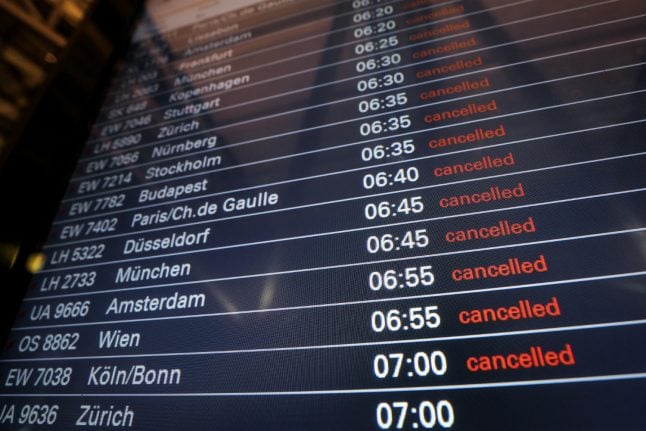
SECURITY
Hundreds of flights axed as fresh strike hits German airports
Hundreds of flights were being cancelled at eight German airports Tuesday, including at the nation's busiest travel hub Frankfurt, as security staff walk off the job in a deepening row over pay.
Published: 15 January 2019 08:06 CET
Updated: 15 January 2019 15:32 CET
Updated: 15 January 2019 15:32 CET

Flights cancelled in Hamburg airport on Tuesday. Photo: DPA
Germany's powerful Verdi union said the strike would last from 02:00 am until 8:00 pm at the airports of Frankfurt, Munich, Hanover, Bremen, Hamburg, Leipzig, Dresden and Erfurt.
At least 220,000 travellers will be hit by cancellations and delays, the ADV airport association said, in a calculation that includes knock-on effects in other airports.
Frankfurt airport operator Fraport, which has now axed 617 out of 1,200 scheduled flights, has urged passengers not to come to Europe's fourth-busiest airport during the strike hours.
German passenger Brigitte Inhof told AFP that she was going to have to travel by bus to a different airport to catch a flight to the Turkish resort of Antalya.
“I should have flown direct from Frankfurt to Antalya, now I have to make my way to Stuttgart,” she said.
At Munich airport, Germany's second largest, a spokeswoman said around 100, mainly domestic, flights were cancelled.
The coordinated industrial action marks a major escalation in Verdi's dispute with employers, following walkouts at Berlin's airports last Monday and in Stuttgart, Cologne/Bonn and Düsseldorf last Thursday.
The coordinated industrial action marks a major escalation in Verdi's dispute with employers, following walkouts at Berlin's airports last Monday and in Stuttgart, Cologne/Bonn and Düsseldorf last Thursday.
Germany's flagship carrier Lufthansa accused Verdi of ramping up tensions “to an unacceptable extent”.
The ADV airport association blasted the wave of strikes as “irresponsible”.
“Verdi is unjustifiably carrying out these strikes on the backs of travellers, airlines and airports,” ADV head Ralph Beisel said in a statement.

Employees in Frankfurt airport on Tuesday. Photo; DPA
'No response'
Verdi, which represents some 23,000 aviation security workers, said it was forced to ramp up pressure because talks with the BDLS employers' association were deadlocked.
“Employers did not respond to last week's warning strikes at all, they haven't come up with an improved offer,” Verdi board member Ute Kittel told public broadcaster ZDF.
The union wants to see wages raised to €20 euros per hour for workers carrying out passenger, freight, personnel and goods checks at all German airports.
Rates currently vary nationwide, with staff in some airports in eastern Germany earning around 14 euros hourly, compared with just over €17 for their peers in the capital and western parts of the country.
“Security is not worth less in the east, and the employees are not worth less,” said Kittel.
The BDLS has baulked at the proposed wage hike, instead offering pay bumps of up to 6.4 percent.
The next round of talks is slated for January 23rd.
Lufthansa, among the airlines worst-hit by the strikes, said Verdi “has no interest in making its contribution to improving Germany as an aviation location”.
“We already have the lowest quality security checks at the highest costs, compared to Europe and other countries around the world,” said Lufthansa board member Detlef Kayser.
The dispute is the latest upheaval for air travellers in Germany, after a series of strikes by Ryanair cabin and cockpit crew in the second of half of 2018, including two pan-European walkouts, caused huge disruptions.
Url copied to clipboard!


 Please whitelist us to continue reading.
Please whitelist us to continue reading.
Member comments